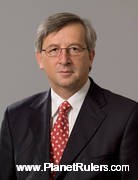Xavier Bettel, Prime Minister of Luxemburg (since Dec 4, 2013)
 Xavier Bettel (born 3 March 1973), a Luxembourg politician and lawyer, has been Prime Minister of Luxembourg since 4 December 2013 when he succeeded Jean-Claude Juncker. Representing the Democratic Party, he has previously served as Mayor of Luxembourg City as well as a member of the Chamber of Deputies and the communal council.
Xavier Bettel (born 3 March 1973), a Luxembourg politician and lawyer, has been Prime Minister of Luxembourg since 4 December 2013 when he succeeded Jean-Claude Juncker. Representing the Democratic Party, he has previously served as Mayor of Luxembourg City as well as a member of the Chamber of Deputies and the communal council.
Bettel was born in Luxembourg City. His father was a wine merchant and his mother was French, of Russian descent.
After high school, Bettel obtained a Masters in Public and European Law and a DEA in Political Science and Public Law from Nancy 2 University in Nancy, France. He also obtained a degree in maritime law and ecclesiastical law from Aristotle University in Thessaloniki, Greece. He has participated in the Erasmus Programme.
For four years in the early 2000s he hosted Sonndes em 8, a weekly talkshow, on the now-defunct private T.TV television network.
Bettel is openly gay, and has stated that increasingly in Luxembourg “people do not consider the fact of whether someone is gay or not.” Bettel is in a relationship with Destenay Gauthier, with whom he often appears at public events. Bettel is Luxembourg’s first openly gay Prime Minister and Europe’s third openly gay head of government following Iceland’s former Prime Minister Jóhanna Sigurðardóttir and Belgium’s current Prime Minister Elio Di Rupo.
Source: http://en.wikipedia.org/wiki/Xavier_Bettel
Jean-Claude Juncker, Former Prime Minister of Luxemburg
Jean-Claude Juncker was born in Redange-sur-Attert in the west of Luxembourg on 9 December 1954 and spent his childhood and youth in Belvaux, in the south of the country, where his father was employed by one of the large steelworks. Life in this region, the stronghold of Luxembourg’s socialist and communist movements and its large Italian and Portuguese immigrant community, made an impression on the young student who, due to his father’s active involvement in the Luxembourg Confederation of Christian Trade Unions (Confédération syndicale chrétienne luxembourgeoise), soon became familiar with the realities of working life.Following secondary school studies at Clairefontaine’s boarding school in Belgium, Jean-Claude Juncker obtained his baccalaureate from the Lycée Michel Rodange in Luxembourg in 1974. He enrolled in the Law Faculty of the University of Strasbourg in 1975 and was awarded a Master of Law in 1979. He took his oath before the Luxembourg Bar Council in February 1980 but never actually carried out the profession of lawyer. It was also in the Alsatian capital that Jean-Claude Juncker met his future wife, Christiane Frising.
His political involvement as a member of the Christian Social Party (Chrëschtlech Sozial Vollekspartei / CSV) dates back to 1974. His oratory skills and analytical mind in particular attracted the attention of the party’s leaders and in October 1979 he was appointed Parliamentary Secretary of the party. Henceforth, his rise within the party was relentless and when a government post became available in December 1982, Jacques Santer, Minister of Finance at the time, urged Prime Minister Pierre Werner to appoint the young Jean-Claude Juncker, a few days before his 28th birthday, as Secretary of State for Labour and Social Security, a role in line with his preferred political interests.
In June 1984, Jean-Claude Juncker was elected to the Luxembourg Parliament (Chamber of Deputies) for the first time. He was appointed Minister of Labour and Minister Delegate for the Budget in the first government headed by Jacques Santer.
In 1985, Luxembourg presided over the Council of the European Communities and Jean-Claude Juncker chaired the “Social Affairs” and “Budget” Councils. This period also marked the beginning of Jean-Claude Juncker’s resolutely pro-European stance, a pledge inspired by his profound conviction that European integration was the sole key to guaranteeing lasting peace throughout Europe and thus to averting the tragedies and calamities of the past, with which Jean-Claude Juncker was all too familiar. As a matter of fact his father had been forcibly recruited by the German Wehrmacht during the Second World War and sent to the Russian front.
Following the general elections of June 1989, Jean-Claude Juncker entered a new chapter of his political career when he was appointed Minister of Finance and Minister of Labour. The Finance portfolio has traditionally been seen as a mandatory rite of passage for future Luxembourg Prime Ministers and so political observers throughout the country all concurred that Jean-Claude Juncker could now be considered Jacques Santer’s heir apparent.
It was furthermore during the 1989-1994 term of office that Jean-Claude Juncker definitely proved himself to be an extraordinary politician and statesman, at both national and European level. In 1991, as incumbent President of the “Ecofin” Council, Jean-Claude Juncker became one of the principal architects of the Maastricht Treaty, in particular of the section on the Economic and Monetary Union of which he drafted large parts himself. He also salvaged Economic and Monetary Union negotiations during an informal meeting of the twelve Member States’ Ministers of Finance in Luxembourg in May 1991 by creating the opting out principle for the United Kingdom. Jean-Claude Juncker was one of the signatories of the Maastricht Treaty in February 1992.
Jean-Claude Juncker’s career, however, could have come to a dramatic end in 1989 when, following a serious road traffic accident, he fell into a coma from which he emerged only two weeks later.
On a national level, Jean-Claude Juncker began preparatory work in 1992 for the most significant tax reform the country had yet to experience. The tax reform entered into force on 1 January 1993.
From January 1990 to February 1995, Jean-Claude Juncker also took on the leadership of the Christian Social Party.
In June 1994, Jean-Claude Juncker was re-elected to Parliament and retained his Minister of Finance and Minister of Labour portfolios. On 20 January 1995, following the nomination of Prime Minister Jacques Santer as President of the European Commission by the European Council and the subsequent approval of this appointment by the European Parliament, Jean-Claude Juncker was appointed Prime Minister and Minister of State by His Royal Highness Grand Duke Jean. Despite now heading the government, he still continued to fulfil his functions as Minister of Finance, Minister of Labour and Employment and Minister for the Treasury.
In his position as head of government, Jean-Claude Juncker broke new ground by enhancing Luxembourg’s profile abroad. He represented Luxembourg on numerous official and work-related visits throughout the world, often accompanied by an important economic delegation. At his instigation, political and economic ties with numerous countries were strengthened. Particular importance was assigned to development cooperation with Luxembourg’s target countries. By 2001, with expenditures totalling 0.8% of its gross domestic product, Luxembourg ranked among the top five most involved countries in terms of development cooperation.
In December 1996, the international press dubbed Jean-Claude Juncker “the hero of Dublin” for his successful mediation during delicate negotiations between German Chancellor Helmut Kohl and French President Jacques Chirac on the subject of the Stability Pact accompanying the Economic and Monetary Union.
The Luxembourg Presidency of the Council of the European Union during the second half of 1997 provided Jean-Claude Juncker with the opportunity to highlight his ambitions for a more socially integrated Europe. In November 1997, the Extraordinary European Council on Employment saw the launch of the so-called “Luxembourg Process” requiring Member States to submit an annual action plan promoting employment and to meet quantified and verifiable criteria in the context of job creation and the fight against unemployment.
One month later, at the European Council of Luxembourg, the European Union opened its doors to the East. The same summit was witness to the creation of “Euro 11”, the informal group of Ministers of Finance involved in the Economic and Monetary Union, since renamed the Eurogroup.
In June 1999, the Christian Social Party once again won the general elections and Jean-Claude Juncker was appointed Prime Minister of a government composed of members of the Christian Social Party and the Democratic Party (Demokratesch Partei / DP), thus putting an end to 15 years of governmental coalition between the Christian Social Party and the Luxembourg Socialist Workers’ Party (Lëtzebuerger Sozialistesch Arbechterpartei / LSAP). Jean-Claude Juncker retained his Finance and Communications portfolios.
On 31 July 2004, Jean-Claude Juncker was reappointed Prime Minister, Minister of State and Minister of Finance in the government formed as a result of the general elections of 13 June 2004, in which he obtained record personal votes. He is currently heading a government made up of the Christian Social Party and the Luxembourg Socialist Workers’ Party.
On 1 January 2005, Jean-Claude Juncker was elected the first permanent president of the Eurogroup, which brings together the Ministers of Finance of the Eurozone Member States.
During the first six months of 2005, the Luxembourg Presidency of the Council of the European Union allowed Jean-Claude Juncker to secure an agreement at the March 2005 European Council on a reform of the Stability and Growth Pact that did not affect the pact’s fundamental principles. During this summit, Jean-Claude Juncker also succeeded in reviving the Lisbon Strategy, in a bid to reaffirm its social and environmental dimensions.
After the French and Dutch “no” to the Treaty establishing a Constitution for Europe, Jean-Claude Juncker focussed all his efforts on the victorious battle leading to a Luxembourgish “yes” in the referendum that took place on 10 July 2005.
A number of international universities have bestowed upon Jean-Claude Juncker the title of doctor honoris causa and he has also been the recipient of several international decorations. In recognition of his commitment to the European cause, Jean-Claude Juncker has been presented with a number of important political awards, notably the International Karlspreis of Aachen in 2006.
After his term as Governor of the World Bank from 1989 to 1995, Jean-Claude Juncker assumed the role of Governor of the International Monetary Fund and that of Governor of the European Bank for Reconstruction and Development (BERD).


